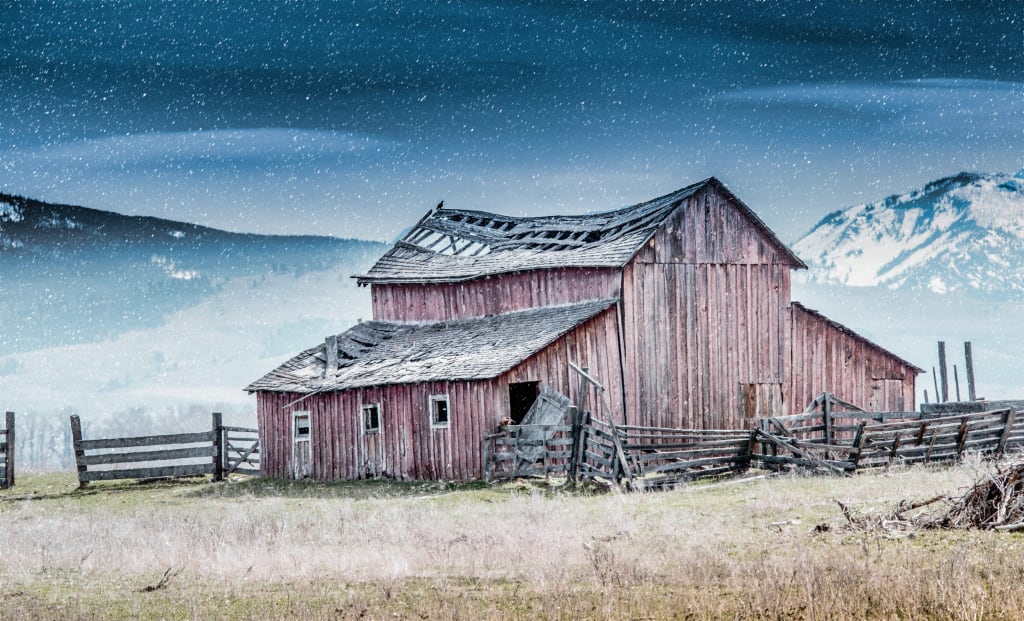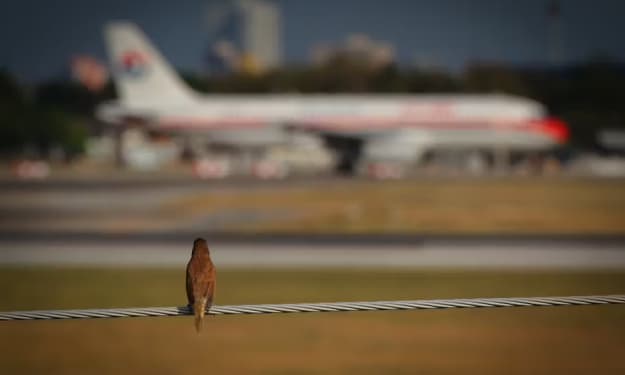
The last thing to come down would be the old barn, with its years of dust and hay, the smells of animals and farm equipment steeped into the grain of the old boards that had turned gray with time and weather. The sunlight pierced through the cracks in the roof and the sides, where birds would occasionally swoop in, building their nests in the rafters.
I stood in the doorway, shielded from the sun, as I watched the old farmhouse come down. The farmhouse where my family had lived for generations. We’d homesteaded this land, back when there wasn’t even a town, really, nothing but cornfields as far as the eye could see. It was still not much more than cornfields, but there were a more buildings now, and if you stood at the top of the barn, up in the hayloft, and leaned just right out of the windows, you could see the top of the steeple for the Baptist church. And on clear days, you could hear the bells from the Catholic church.
Now, there were telephone wires, dropping down and rising up again from pole to pole, veering off the road to the old farmhouses, built by hardy pioneers decades ago. Farmhouses that were now coming down.
I ran my hand carefully over the old wooden doorframe, mindful of the splinters. Daddy’s hands had always been work roughened and calloused from driving the tractor and working with the crops and the animals. I turned, automatically looking to see if the tractor needed anything, but it didn’t. The place where he’d always parked it was empty, just like everything else. I could still smell the oil and grease and gasoline smell that lingered around the tractor after a day’s work, the way he’d carefully tend to it, to make sure it would be in good working order for the next day’s labor.
I walked down the center of the barn, between the stalls, touching the posts between them by memory, remembering the animals that had lived there, both friends to a lonely child, and later food to our family. Cows we’d milked, chickens we’d kept in here in the harsh winters. Even a pig, one disastrous year. I smiled ruefully when I got to the back where he’d been kept. I hadn’t wanted to kill him, ever, and Daddy had said that wasn’t how pigs worked, and off to the slaughter he went.
Old windows and doors and decorative pieces of the house were stacked carefully in all the stalls. Things that had been salvaged for other people to put in their homes as “shabby chic” décor. To us, they had just been…our home. Maybe shabby, sure. But shabby from decades of living. Not shabby from want of love. My mother had been so proud of that wainscoting. My great-grandmother would be horrified to see her cast iron stove in the barn stall where we’d milked cows, the stove she’d sent away to the east coast for and waited for weeks to get. The old washing machine was in the stall next to it. The wash tub, where we’d taken baths as children was on its end behind the washing machine. And now, someone was going to buy them as novelties. Something to tell their friends about.
The old barn was full of these things. Things my pioneer ancestors had worked hard for and cherished and now, they were going to be used as novelty items, perhaps as planters for flowers, or giant ice buckets for outdoor parties. The life was going out of the barn, as the life had left the house.
Without my mother, my father and I hadn’t had much to talk about. Except how much I didn’t want to be there. I’d spent hours in the hayloft, reading books and dreaming of the day I could leave. I’d only come down for necessary chores and school. And then, as soon as I’d been able, I’d left. I hadn’t come back.
His voice had slowly gotten farther and farther away on the phone, even as the phone lines got clearer and clearer over the years. Until one day, it wasn’t his voice anymore. But someone else, telling me I had to come back. I had to deal with the house and the land.
I walked back to the door and watched as the last wall of the farmhouse collapsed tiredly, sending up a cloud of dust and dirt. The foreman came over to me, stepping into the cool and shade of the barn. He looked around appreciatively.
“This looks like it’s about ready to fall on its own. Probably won’t take as much work.”
I smiled tightly. “I do still have quite a bit stored in here,” I motioned to the items in the stalls “but I plan to have it all out in the next day or so. Will that be a problem?”
He shook his head and swiped his sweaty face with a handkerchief. “Not at all. It’ll take us some time to clear that.” He motioned to the rubble of my childhood home. “You just let us know when you’re ready and we’ll be back to deal with the barn.”
I nodded but didn’t say anything else. There wasn’t much to say. I had a trailer ready to bring in to load up, and a couple of people to help me, I just needed the men who were demolishing the house to give me an all clear that it was safe.
“So, I can start loading up?” I clarified when he didn’t say anything clarifying.
“Sure, just come in the back way. It’s…”
“I know the back way,” I interrupted him. “I grew up here, remember.”
He studied me for a second but picked up that I wasn’t exactly in a chatty mood and headed back out into the hot sunshine, shouting at someone to get back to work.
I turned back to the barn and send a quick text to call my movers and get started. I look up at the rafters, again noticing the birds’ nests that Daddy would never have let stand. I moved to the back of the barn, determined to move the nests before the barn was destroyed.
The ladder’s rungs creaked under my weight as I carefully climbed up, the dust motes dancing in the beams of sunlight coming through the holes in the roof. I could see then that there were holes in the floor of the hayloft I didn’t really notice before, hidden as they were in the shadows of the stalls. This whole place looked like a good wind would just knock it down.
I walked carefully, watching where I put each foot, testing carefully before I put my full weight down. The birds were flying around nervously. I saw then that the nests had young birds in them. It wasn’t too late for that, but they should have been almost old enough to leave the nest. A few more weeks, and the nests would have been empty. A few more weeks, and I wouldn’t have been up there, risking my neck to save some stupid birds their own homes, while mine lay in a pile of boards and bricks just a few yards away.
Once I was close enough to the nests to see the young birds, and the adults were perched far enough away to keep an eye on me, I was at a loss as to what to do next. Did I knock the nests down, and hope the young birds could fly and take care of themselves? There were so many nests, and I couldn’t actually reach them all. The old ones I debated leaving, but would the birds just move to those if I knocked down the new ones? I didn’t know.
I was debating finding a long stick or something to gently push the nests off the beam when I heard the ominous sound of cracking moments before the boards below me gave way and I plummeted to the barn floor below.
I landed with a hard thud and felt pain radiating through my body as the air left my lungs in a huge whoosh. The birds were startled out of the rafters, even the young ones flying out of the nests. I was relieved momentarily that they could all fly, at least a bit. I stared at the ceiling, at the scraps of blue sky visible through the shreds of wooden planks that made up the roof.
I couldn’t move. My breath was coming back slowly, but I couldn’t move. I closed my eyes and breathed in slowly, smelling the earthy, animal smell of the barn. I could smell my mother’s laundry detergent and my father’s tractor. I could smell the feed bags and the seed corn. I could hear the animals shuffling in their stalls, their big warm bodies bumping up against the walls as they shifted around. I felt the warm trickle of blood on the side of my face and knew that something was wrong inside my body.
I was going to die here, inside this barn. Like Daddy did. Like so many generations of my family did, dying on this land they loved. Like I was determined not to do.
I opened my eyes, and I could see them, now. Gathered around me in their simple, homespun clothes. Daddy in his old jeans and checked shirt, worn work boots. Mom in her faded dress. My grandparents in similar clothes, great-grandparents, aunts and uncles. People whose names I don’t know but who’s faces I wear. People who worked this land with love and sweat and tears. Who fought for it and died for it. Who wanted it. And now I’d given up on it.
“It’s all right,” says Daddy. “It wasn’t for you. Farming is hard work. It wasn’t for you.” I felt tears leaking out of my eyes. “It’s all right.” He squats down and wipes at my face, his hands gentle. “I was always so proud of you, of who you became. You have to know that.”
I tried to shake my head, but it hurts. “No,” I wheezed.
He looked sad. “I should have said it more.” He looked out at the rubble of the house. “A house is just a building. A barn is just a building. People make it a home.” He shook his head sadly. “It was never a home without you. And if you don’t want it,” he shrugged “then move on. Do what you want to do.” He looked at the group gathered around me. “We don’t mind. This land hasn’t been much luck for many of us. Maybe selling it will be lucky for you.”
I closed my eyes. I wouldn’t be able to. I was going to die here. “Ok,” I managed.
When I opened my eyes again, they were all gone, but I felt the guilt of selling everything lifted somewhat. In their place, the foreman was standing over me, his eyes wide.
“Did you go up in the hayloft?” he asked, carefully patting me down. I realized I could feel his hands on my legs. “That place is a death trap. Didn’t you see the danger signs?”
I grunted. I hadn’t noticed any signs. He swore under his breath and barked something into a radio, then looked back at me. “You fell at just the right time. We heard the crash during a lull in the noise. If you’d fallen two seconds later or earlier, we’d never have heard you and you’d have lain here all night. Lucky you.”
I closed my eyes and nodded. “Lucky me.”
“Just…stay still. Help is on the way.”
I opened my eyes and looked up again, the last time I will in the old barn. I looked again at the sky through the roof. I saw the birds returning to their nests and watching me. I saw the clouds. I saw Daddy. I smiled. Lucky.
About the Creator
Enjoyed the story? Support the Creator.
Subscribe for free to receive all their stories in your feed. You could also pledge your support or give them a one-off tip, letting them know you appreciate their work.






Comments
There are no comments for this story
Be the first to respond and start the conversation.